33 start with W start with W
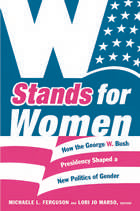
In W Stands for Women ten feminist scholars analyze various aspects of Bush’s persona, language, and policy to show how his administration has shaped a new politics of gender. One contributor points out the shortcomings of “compassionate conservatism,” a political philosophy that requires a weaker class to be the subject of compassion. Another examines Lynndie England’s participation in the abuse of prisoners at Abu Ghraib in relation to the interrogation practices elaborated in the Army Field Manual, practices that often entail “feminizing” detainees by stripping them of their masculine gender identities. Whether investigating the ways that Bush himself performs masculinity or the problems with discourse that positions non-Western women as supplicants in need of saving, these essays highlight the far-reaching consequences of the Bush administration’s conflation of feminist rhetoric, conservative gender ideology, and neoconservative national security policy.
Contributors. Andrew Feffer, Michaele L. Ferguson, David S. Gutterman, Mary Hawkesworth, Timothy Kaufman-Osborn, Lori Jo Marso, Danielle Regan, R. Claire Snyder, Iris Marion Young, Karen Zivi
Michaela Ferguson and Karen Zivi appeared on KPFA’s Against the Grain on September 11, 2007. Listen to the audio.
Michaela Ferguson and Lori Jo Marso appeared on WUNC’s The State of Things on August 30, 2007. Listen to the audio.

Anxieties about crime today have become a familiar route for the creation of new government agencies and the extension of state authority. It is important to remember the original "war on crime" in the 1930s-and the opportunities it afforded to New Dealers and established bureaucrats like J. Edgar Hoover-as scholars grapple with the ways states assert influence over populations, local authority, and party politics while they pursue goals such as reducing popular violence and protecting private property.
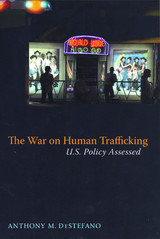
The public's understanding of human trafficking is comprised of terrible stories like these, which the media covers in dramatic, but usually short-lived bursts. The more complicated, long-term story of how policy on trafficking has evolved has been largely ignored. In The War on Human Trafficking, Anthony M. DeStefano covers a decade of reporting on the policy battles that have surrounded efforts to abolish such practices, helping readers to understand the forced labor of immigrants as a major global human rights story.
DeStefano details the events leading up to the creation of the Trafficking Victims Protection Act of 2000, the federal law that first addressed the phenomenon of trafficking in persons. He assesses the effectiveness of the 2000 law and its progeny, showing the difficulties encountered by federal prosecutors in building criminal cases against traffickers. The book also describes the tensions created as the Bush Administration tried to use the trafficking laws to attack prostitution and shows how the American response to these criminal activities was impacted by the events of September 11th and the War in Iraq.
Parsing politics from practice, this important book gets beyond sensational stories of sexual servitude to show that human trafficking has a much broader scope and is inextricable from the powerful economic conditions that impel immigrants to put themselves at risk.

Paul Rogers is one of the world's leading security experts. Since the 11 September attacks, he has been a regular guest on TV news channels throughout America and Britain, where he has offered expert advice on the real implications of 9/11 and Bush's 'war on terror'. His articles in newspapers around the world, and in the web journal Open Democracy, have become essential reading for many thousands of people, including government officials, senior military, heads of UN agencies, opinion formers, journalists and peace activists.
A War on Terror is Paul Roger's radical assessment of Bush's new policy, the way it has affected world security and the grave implications that it holds for future peace, not only in the Middle East but throughout the world. Moving from the war in Afghanistan and its aftermath to the Israeli/Palestinian conflict, the continuing development of al-Qaida and its associates through to the war on Iraq, Rogers presents a uniquely cogent analysis of these rapid and traumatic events.
In a world in which the US and other states of the Atlantic community are increasingly speaking a different language to that of the majority of the world, Paul Rogers offers a vital critical assessment of the language of dominance and control as 'the New American Century' unfolds.
For the US, in particular, the post-9/11 world is one in which it is essential to maintain firm control of international security, extending to pre-emptive military action. In this book, Rogers demonstrates how futile, mistaken and deeply counter-productive that belief is, and points the way to more effective routes to a more just and secure world.
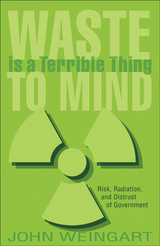
It is an unenviable task, but one that all state governments face: finding a final “resting place” for low-level nuclear waste from power plants, hospitals, university laboratories, and other industries. John Weingart was the official in New Jersey who for many years led this onerous charge. This book is the story of how he and a commission appointed by the governor, instead of imposing a top-down solution, designed an approach that would confront public fears by seeking a community that would volunteer to host a disposal facility. Initially, this novel approach was surprisingly successful, as leaders in a dozen municipalities stepped forward to say they might be interested. Once their interest became known, however, the process in each town derailed. Residents demanded assurances of zero-percent risk and expressed profound distrust of government assertions and promises.
Waste Is a Terrible Thing to Mind is a compelling, suspenseful, and amusing insider’s account of New Jersey policy and politics, but it is also a larger saga of the challenges facing society in the post–9/11 era when the public’s distrust of government is increasing at the same time that its sensitivity to health and safety threats is heightened.
For more information, see: http://wasteisaterriblethingtomind.com/
"Written with a wry sense of humor, it is a pleasure to read and could provide the blueprint for future efforts to find locations for controversial land uses."
- Marie Curtis, Executive Director, New Jersey Environmental Lobby
"A penetrating look at one state's struggle with radioactive waste ... offering some tantalizing reflections on the public understanding of science and how we, in a democratic society, deal with complexity and uncertainty."
- Jay Kaufman, State Senator, Massachusetts State Legislature
"A provocative story, laced with humor, demonstrates how public distrust of government can make it impotent. It should be read by anyone working on public policy issues, especially planning, growth, and the environment."
- Harriet Keyserling, Former Energy Committee Chair, South Carolina State Legislature
"Readers interested in environmental policy, land use and how governments make decisions will learn much from this fine reflective insider's account. It's also a primer on how to survive and thrive in state government."
- David N. Kinsey, Visiting Professor, Woodrow Wilson School Princeton University
"... a fascinating case study of how a government agency creatively tried to solve an intractable public issue. Although the agency failed in its quest to recruit a town to host a low-level radioactive waste site, Weingart's detailed and often humorous narrative of the agency's efforts is a clear winner."
- Jack Sabatino, Judge, New Jersey Superior Court
"... a very engaging and sometimes discouraging case study about the pitfalls and perils of trying to site a controversial facility the right way."
- Gregg Larson, Administrator, Center for Biometric Research, University of Minnesota
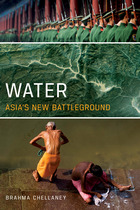
Winner of the Asia Society's Bernard Schwartz 2012 Book Award
The battles of yesterday were fought over land. Those of today are over energy. But the battles of tomorrow may be over water. Nowhere is that danger greater than in water-distressed Asia.
Water stress is set to become Asia’s defining crisis of the twenty-first century, creating obstacles to continued rapid economic growth, stoking interstate tensions over shared resources, exacerbating long-time territorial disputes, and imposing further hardships on the poor. Asia is home to many of the world's great rivers and lakes, but its huge population and exploding economic and agricultural demand for water make it the most water-scarce continent on a per capita basis. Many of Asia’s water sources cross national boundaries, and as less and less water is available, international tensions will rise. The potential for conflict is further underscored by China’s unrivaled global status as the source of transboundary river flows to the largest number of countries, ranging from India and Vietnam to Russia and Kazakhstan; yet a fast-rising China has declined to enter into water-sharing or cooperative treaties with these states, even as it taps the resources of international rivers.
Water: Asia’s New Battleground is a pioneering study of Asia’s murky water politics and the relationships between fresh water, peace, and security. In this unique and highly readable book, Brahma Chellaney expertly paints a larger picture of water across Asia, highlights the security implications of resource-linked territorial disputes, and proposes real strategies to avoid conflict and more equitably share Asia’s water resources.
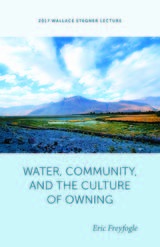
Building on these cultural critiques, Freyfogle takes up the issue of private property rights, highlighting the longstanding flexibility of this key American institution as well as the moral imperative to ensure that property rights aren’t used in ways that harm communities. Outdated understandings about private property, he concludes, have further confused our understanding and made sensible solutions to water problems even harder to imagine. Water-policy reform won’t happen, Freyfogle argues, until we reconsider how we understand nature and take charge of the institution of ownership, recasting it so as to increase the benefits it generates for everyone. If we can do that, solutions to water troubles could prove easier than we expect. The work concludes with an original, sweeping policy proposal to resolve the West’s water shortages and meet environmental needs in ways fair to all.
This lecture was presented on March 22, 2017, at the 22nd annual symposium sponsored by the Wallace Stegner Center for Land, Resources and the Environment at the S. J. Quinney College of Law, University of Utah.
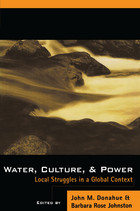
According to some estimates, at least 1.7 billion people do not have an adequate supply of drinking water and as many as 40% of the world's population face chronic shortages. Yet water scarcity is more than a matter of terrain, increased population, and climate. It can also be a byproduct or end result of water management, where the building of dams, canals, and complicated delivery systems provide water for some at the cost of others, and result in short-term gains that wreak long-term ecological havoc. Water scarcity can also be a product of the social systems in which we live.
Water, Culture, and Power presents a series of case studies from around the world that examine the complex culture and power dimensions of water resources and water resource management. Chapters describe highly contested and contentious cases that span the continuum of water management concerns from dam construction and hydroelectric power generation to water quality and potable water systems. Sections examine: impact of water resource development on indigenous peoples varied cultural meanings of water and water resources political process of funding and building water resource projects tensions between culture and power as they structure perceptions and experiences of water scarcity, transforming water from natural resource to social constructio.
Case studies include Lummi nation challenges to water rights in the northwest United States; drinking water quality issues in Oaxaca de Juarez, Mexico; the effects of tourism development in the Bay Islands, Honduras; water scarcity on St. Thomas, the Virgin Islands; the role of water in the Arab-Israeli conflict; and other national and regional situations including those from Zimbabwe, Japan, and Bangladesh.
While places and cases vary, all chapters address the values and meanings associated with water and how changes in power result in changes in both meaning and in patterns of use, access, and control. Water, Culture, and Power provides an important look at water conflicts and crises and is essential reading for students, researchers, and anyone interested in the role of cultural factors as they affect the political economy of natural resource use and control.
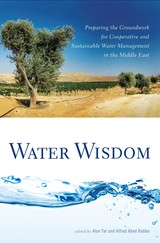
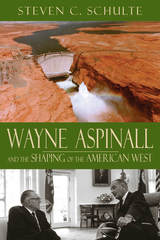
In Wayne Aspinall and the Shaping of the American West, Steven C. Schulte details a political career that encompassed some of the most crucial years in the development of the twentieth-century West. As chairman of the House Interior and Insular Affairs Committee from 1959 to 1973, Aspinall shaped the nation's reclamation, land, wilderness, and natural resource policies. His crusty and dtermined personality was at the enter of some of the key environmental battles of the twentieth century, including the Echo Park Dam fight, the struggle for the Wilderness Act, and the long controversy over the Central Arizona Project.
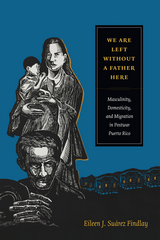

Weapon of the Strong analyses the forms of US state terrorism through exclusive, never before published interviews with leading commentators and theorists, including Noam Chomsky, Edward S. Herman, Richard A. Falk, Judith Butler, Ted Honderich, Norman Finkelstein and Gilbert Achcar. The interviews explore the different aspects of state terrorism: its functions, institutional supports and the legal and moral arguments surrounding it, and consider specific case studies in Europe, Latin America and the Middle East.
Weapon of the Strong makes an indispensable contribution to contemporary debates on terrorism and constructs a damning critique of US foreign policy from World War Two to the present day.
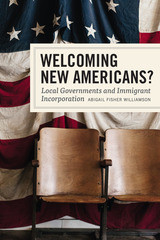
Abigail Fisher Williamson explores why and how local governments across the country are taking steps to accommodate immigrants, sometimes despite serious political opposition. Drawing on case studies of four new immigrant destinations—Lewiston, Maine; Wausau, Wisconsin; Elgin, Illinois; and Yakima, Washington—as well as a national survey of local government officials, she finds that local capacity and immigrant visibility influence whether local governments take action to respond to immigrants. State and federal policies and national political rhetoric shape officials’ framing of immigrants, thereby influencing how municipalities respond. Despite the devolution of federal immigration enforcement and the increasingly polarized national debate, local officials face on balance distinct legal and economic incentives to welcome immigrants that the public does not necessarily share. Officials’ efforts to promote incorporation can therefore result in backlash unless they carefully attend to both aiding immigrants and increasing public acceptance. Bringing her findings into the present, Williamson takes up the question of whether the current trend toward accommodation will continue given Trump’s anti-immigrant rhetoric and changes in federal immigration policy.
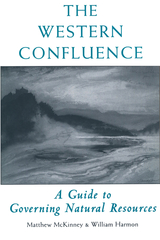
For 150 years, the American West has been shaped by persistent conflicts over natural resources. This has given rise to a succession of strategies for resolving disputes-prior appropriation, scientific management, public participation, citizen ballot initiatives, public interest litigation, devolution, and interest-based negotiation. All of these strategies are still in play, yet the West remains mired in gridlock. In fact, these strategies are themselves a source of conflict.
The Western Confluence is designed to help us navigate through the gridlock by reframing natural resource disputes and the strategies for resolving them. In it, authors Matthew McKinney and William Harmon trace the principles of natural resource governance across the history of western settlement and reveal how they have met at the beginning of the twenty-first century to create a turbid, often contentious confluence of laws, regulations, and policies. They also offer practical suggestions for resolving current and future disputes. Ultimately, Matthew McKinney and William Harmon argue, fully integrating the values of interest-based negotiation into the briar patch of existing public decision making strategies is the best way to foster livable communities, vibrant economies, and healthy landscapes in the West.
Relying on the authors' first-hand experience and compelling case studies, The Western Confluence offers useful information and insight for anyone involved with public decision making, as well as for professionals, faculty, and students in natural resource management and environmental studies, conflict management, environmental management, and environmental policy.
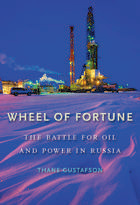
A Foreign Affairs Best Book of the Year on Eastern Europe and the Former Soviet Republics
The Russian oil industry—which vies with Saudi Arabia as the world’s largest producer and exporter of oil, providing nearly 12 percent of the global supply—is facing mounting problems that could send shock waves through the Russian economy and worldwide. Wheel of Fortune provides an authoritative account of this vital industry from the last years of communism to its uncertain future. Tracking the interdependence among Russia’s oil industry, politics, and economy, Thane Gustafson shows how the stakes extend beyond international energy security to include the potential threat of a destabilized Russia.
“Few have studied the Russian oil and gas industry longer or with a broader political perspective than Gustafson. The result is this superb book, which is not merely a fascinating, subtle history of the industry since the Soviet Union’s collapse but also the single most revealing work on Russian politics and economics published in the last several years.”
—Robert Legvold, Foreign Affairs
“The history of Russia’s oil industry since the collapse of communism is the history of the country itself. There can be few better guides to this terrain than Thane Gustafson.”
—Neil Buckley, Financial Times
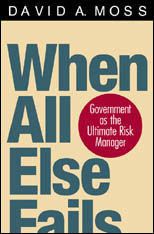
One of the most important functions of government—risk management—is one of the least well understood. Moving beyond the most familiar public functions—spending, taxation, and regulation—When All Else Fails spotlights the government’s pivotal role as a risk manager. It reveals, as never before, the nature and extent of this governmental function, which touches almost every aspect of economic life.
In policies as diverse as limited liability, deposit insurance, Social Security, and federal disaster relief, American lawmakers have managed a wide array of private-sector risks, transforming both the government and countless private actors into insurers of last resort. Drawing on history and economic theory, David Moss investigates these risk-management policies, focusing in particular on the original logic of their enactment. The nation’s lawmakers, he finds, have long believed that pervasive imperfections in private markets for risk necessitate a substantial government role. It remains puzzling, though, why such a large number of the resulting policies have proven so popular in a country famous for its anti-statism. Moss suggests that the answer may lie in the nature of the policies themselves, since publicly mandated risk shifting often requires little in the way of invasive bureaucracy. Well suited to a society suspicious of government activism, public risk management has emerged as a critical form of government intervention in the United States.

Does state acquisition of nuclear weapons lead to stability and peace or instability and crises? This is one of the great debates in international relations scholarship. Michael D. Cohen argues that nuclear weapons acquisition often does dangerously embolden the acquiring state to undertake coercion and aggression, but that this behavior moderates over time as leaders learn the dangers and limitations of nuclear coercion. This book examines the historical cases of the Soviet Union and Pakistan in depth and also looks at mini-cases involving the United States, China, and India. This book broadens our understanding of how leaders and states behave when they acquire nuclear weapons and is important reading for scholars and students of international relations, security studies, and political psychology.
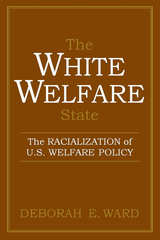
"In The White Welfare State, Deborah Ward assembles a powerful array of documentary and statistical evidence to reveal the mechanisms, centrality, and deep historical continuity of racial exclusion in modern 'welfare' provision in the United States. Bringing unparalleled scrutiny to the provisions and implementation of state-level mothers' pensions, she argues persuasively that racialized patterns of welfare administration were firmly entrenched in this Progressive Era legislation, only to be adopted and reinforced in the New Deal welfare state. With rigorous and clear-eyed analysis, she pushes us to confront the singular role of race in welfare's development, from its early 20th-century origins to its official demise at century's end."
--Alice O'Connor, University of California at Santa Barbara
"This is a richly informative and arresting work. The White Welfare State will force a reevaluation of the role racism has played as a fundamental feature in even the most progressive features of the American welfare state. Written elegantly, this book will provoke a wide-ranging discussion among social scientists, historians, and students of public policy."
--Ira Katznelson, Ruggles Professor of Political Science and History, Columbia University
"This book offers an original and absorbing account of early policies that shaped the course of the American welfare state. It extends yet challenges extant interpretations and expands our understanding of the interconnections of race and class issues in the U.S., and American political development more broadly."
--Rodney Hero, University of Notre Dame

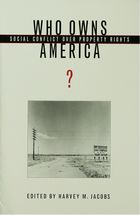
Land ownership by individual citizens is a cornerstone of American heritage and a centerpiece of the American dream. Thomas Jefferson called it the key to our success as a democracy. Yet the question of who owns America not only remains unanswered but is central to a fundamental conflict that can pit private property rights advocates against government policymakers and environmentalists.
Land use authority Harvey M. Jacobs has gathered a provocative collection of perspectives from eighteen contributors in the fields of law, history, anthropology, economics, sociology, forestry, and environmental studies. Who Owns America? begins with the popular view of land ownership as seen though the television show Bonanza! It examines public regulation of private land; public land management; the roles culture and ethnic values play in land use; and concludes with Jacobs’ title essay.
Who Owns America? is a powerful and illuminating exploration of the very terrain that makes us Americans. Its broad set of theoretical and historical perspectives will fascinate historians, environmental activists, policy makers, and all who care deeply about the land we share.

Global warming has finally made clear the true costs of using our atmosphere as a giant sponge to soak up unwanted by-products of industrial activity. As nations, businesses, and citizens seek workable yet fair solutions for reducing carbon emissions, the question of who should pay -- and how -- looms large. Yet the surprising truth is that a system for protecting the atmosphere could be devised that would yield cash benefits to us all.
In Who Owns the Sky?, visionary entrepreneur Peter Barnes redefines the debate about the costs and benefits of addressing climate change. He proposes a market-based institution called a Sky Trust that would set limits on carbon emissions and pay dividends to all of us, who collectively own the atmosphere as a commons. The Trust would be funded by requiring polluters to pay for the right to emit carbon dioxide, and managed by a non-governmental agency. Dividends would be paid annually, in much the same way that residents of Alaska today receive cash benefits from oil companies that drill in their state.
Employing the same spirit of innovation that brought millions of dollars to the nonprofit sector through his company Working Assets, Barnes sets forth a practical new approach to protecting our shared inheritance -- not only the atmosphere, but water, forests, and other life-sustaining and economically valuable common resources. He shows how we can use markets and property rights to preserve and share the vast wealth around us, allowing us not only to profit from it, but to pass it on, undiminished, to future generations.
Who Owns the Sky? is a remarkable look at the future of our economy, one in which we can retain capitalism's virtues while mitigating its vices. Peter Barnes draws on his personal experience as a successful entrepreneur to offer viable solutions to some of our most pressing environmental and social concerns.
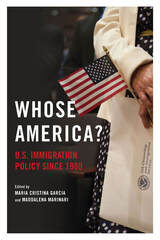
Up-to-date yet rooted in history, Whose America? provides a sophisticated account of recent immigration policy while mapping the ideological struggle to answer an essential question: which people have the right to make America their home or refuge?
Contributors: Leisy Abrego, Carl Bon Tempo, Julio Capó, Jr., Carly Goodman, Julia Rose Kraut, Monique Laney, Carl Lindskoog, Yael Schacher, and Elliott Young
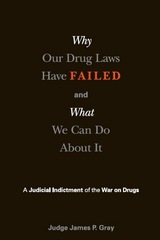
We have built large numbers of prisons, but they are overflowing with non-violent drug offenders. The huge profits made from drug sales are corrupting people and institutions here and abroad. And far from being protected by our drug prohibition policy, our children are being recruited by it to a lifestyle of drug use and drug selling.
Judge Gray's book drives a stake through the heart of the War on Drugs. After documenting the wide-ranging harms caused by this failed policy, Judge Gray also gives us hope. We have viable options. The author evaluates these options, ranging from education and drug treatment to different strategies for taking the profit out of drug-dealing.
Many officials will not say publicly what they acknowledge privately about the failure of the War on Drugs. Politicians especially are afraid of not appearing "tough on drugs." But Judge Gray's conclusions as a veteran trial judge and former federal prosecutor are reinforced by the testimonies of more than forty other judges nationwide.
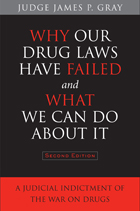
Our drug prohibition policy is hopeless, just as Prohibition, our alcohol prohibition policy, was before it. Today there are more drugs in our communities and at lower prices and higher strengths than ever before.
We have built large numbers of prisons, but they are overflowing with non-violent drug offenders. The huge profits made from drug sales are corrupting people and institutions here and abroad. And far from being protected by our drug prohibition policy, our children are being recruited by it to a lifestyle of drug use and drug selling.
Judge Gray’s book drives a stake through the heart of the War on Drugs. After documenting the wide-ranging harms caused by this failed policy, Judge Gray also gives us hope. We have viable options. The author evaluates these options, ranging from education and drug treatment to different strategies for taking the profit out of drug-dealing.
Many officials will not say publicly what they acknowledge privately about the failure of the War on Drugs. Politicians especially are afraid of not appearing "tough on drugs." But Judge Gray’s conclusions as a veteran trial judge and former federal prosecutor are reinforced by the testimonies of more than forty other judges nationwide.
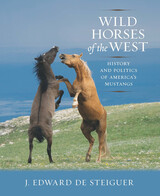
In Wild Horses of the West, J. Edward de Steiguer provides an entertaining and well-researched look at one of the most controversial animal welfare issues of our time—the protection of free-roaming horses on the West’s public lands. This is the first book in decades to include the entire story of these magnificent animals, from their evolution and biology to their historical integration into conquistador, Native American, and cowboy cultures. And the story isn’t over. De Steiguer goes on to address the modern issues— ecology, conservation, and land management—surrounding wild horses in the West today.
Featuring stunning color photographs of wild horses, this extremely thorough and engaging blend of history, science, and politics will appeal to students of the American West, conservation activists, and anyone interested in the beauty and power of these striking animals.
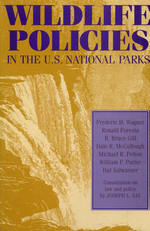
This volume presents the results of a five-year study of wildlife-management policies in national parks. It synthesizes interviews with individuals inside and outside the National Park Service, provides a comprehensive review of published and unpublished literature, and draws on the collective experience of the authors with various units of the system over the past three decades. Among the topics examined are:
- the structure and history of the National Park System and Service
- wildlife "problems" in the parks
- the role of science in formulating policies and in management
- recommendations for changes in policy formulation, management, and scientific research procedures
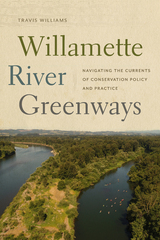
Travis Williams, executive director of Willamette Riverkeeper, has spent countless hours paddling the Willamette, becoming familiar with its flora, fauna, and human neighbors. In Willamette River Greenways, he combines personal narrative about his experiences on the river with nuanced consideration of the controversies and challenges of the Greenway Program. Williams sheds light on current land stewardship practices, revealing the institutional and leadership failures that endanger the river’s water quality and habitat, and looks to the program’s future. He also takes readers with him onto the water, sharing what it’s like to travel the river by canoe, paying homage to the river’s natural beauty and the host of wildlife species that call it home.
Part policy analysis, part advocacy, and all love letter to one of Oregon’s great rivers, Willamette River Greenways offers valuable perspective to policymakers, land use managers, and recreational river users alike.
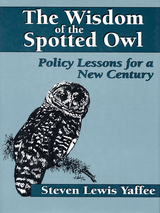
The controversy over the management of national forests in the Pacific Northwest vividly demonstrates the shortcomings of existing management institutions and natural resource policies. The Wisdom of the Spotted Owl explores the American policymaking process through the case of the spotted owl -- a case that offers a striking illustration of the failure of our society to cope with long-term, science-intensive issues requiring collective choices.
Steven Lewis Yaffee analyzes the political and organizational dynamics from which the controversy emerged and the factors that led to our stunning inability to solve it. He examines the state of resource management agencies and policy processes, providing insight into questions such as:
- What caused the extreme polarization of opinion and lack of communication throughout the 1980s and early 1990s?
- How can the inadequate response of government agencies and the failure of the decisionmaking process be explained?
- What kinds of changes must be made to enable our resource policy institutions to better deal with critical environmental issues of the 1990s and beyond?
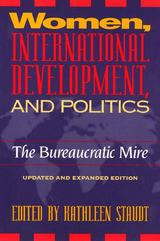
At the same time, non-governmental organizations have continued to expand a policy agenda with a concern for women, thanks to the Fourth World Congress on Women and a series of United Nations-affiliated meetings leading up to the one on population and development in Cairo in 1994 and, most important, the Beijing Conference in December 1995, attended by 50,000 people.
Two new essays and a new conclusion reflect the upsurge of interest in women and development since 1990. An introductory essay by Sally Baden and Anne Marie Goetz focuses on the conflict over the term "gender" at the Beijing Conference and the continuing divisions between conservative women and feminists and also between representatives of the North and South.
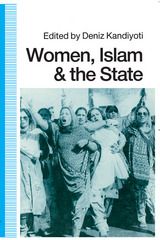
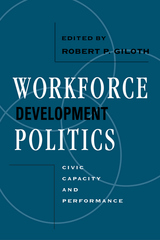
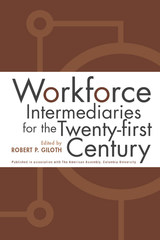
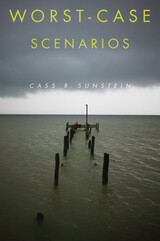
Nuclear bombs in suitcases, anthrax bacilli in ventilators, tsunamis and meteors, avian flu, scorchingly hot temperatures: nightmares that were once the plot of Hollywood movies are now frighteningly real possibilities. How can we steer a path between willful inaction and reckless overreaction?
Cass Sunstein explores these and other worst-case scenarios and how we might best prevent them in this vivid, illuminating, and highly original analysis. Singling out the problems of terrorism and climate change, Sunstein explores our susceptibility to two opposite and unhelpful reactions: panic and utter neglect. He shows how private individuals and public officials might best respond to low-probability risks of disaster—emphasizing the need to know what we will lose from precautions as well as from inaction. Finally, he offers an understanding of the uses and limits of cost–benefit analysis, especially when current generations are imposing risks on future generations.
Throughout, Sunstein uses climate change as a defining case, because it dramatically illustrates the underlying principles. But he also discusses terrorism, depletion of the ozone layer, genetic modification of food, hurricanes, and worst-case scenarios faced in our ordinary lives. Sunstein concludes that if we can avoid the twin dangers of overreaction and apathy, we will be able to ameliorate if not avoid future catastrophes, retaining our sanity as well as scarce resources that can be devoted to more constructive ends.
READERS
Browse our collection.
PUBLISHERS
See BiblioVault's publisher services.
STUDENT SERVICES
Files for college accessibility offices.
UChicago Accessibility Resources
home | accessibility | search | about | contact us
BiblioVault ® 2001 - 2024
The University of Chicago Press









